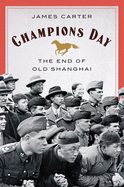
In November 1941, the International Settlement in Shanghai had stood as a "Lone Island" within Japanese-controlled China for four years--surrounded by Japanese forces yet protected from invasion by Japan's relationships with the countries whose nationals controlled it. With the Japanese attack on Pearl Harbor, Shanghai's protected status crumbled. In Champion's Day: The End of Old Shanghai, historian James Carter (Heart of Buddha, Heart of China) thoughtfully explores the history of the city through the lenses of a single cultural institution, the Shanghai Race Club, and the events of a single day, November 12, 1941, when the club held its last Champion's Day races.
Contending that the Shanghai Race Club was the social heart of the International Settlement, Carter introduces readers to the world of Chinese pony racing in Shanghai: the breed, the owners, the horses, the jockeys, the gambling and the races themselves. He uses the rules for membership in the club and for attendance at its races as tools for understanding Shanghai's history and cosmopolitan culture. He explores the complexities of racism and wealth in Shanghai, looking at the European population of the International Settlement (and its flexible definition of Europe), the role of interracial elites in constructing Shanghai's international culture, and the attempts of the city's Westernized Chinese elites to integrate themselves into that culture.
The result is a nuanced history of a complex, multicultural city, which was created as a compromise between European imperialism and Chinese isolationism, and developed into something that was both and neither. --Pamela Toler, blogging at History in the Margins

